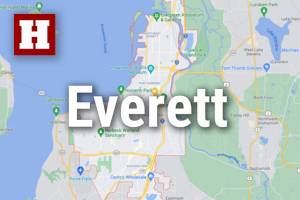Long-closed gazebo at Everett’s Clark Park may be set free
Published 1:30 am Thursday, January 30, 2020


EVERETT — Clark Park’s historic gazebo finally may come out from behind its cage.
Everett’s parks staff is considering removing the fence that has surrounded the covered structure for nearly two decades. Doing so could prevent visitors from thinking there’s something wrong with the gazebo, or the rest of the park at 2400 Lombard Ave., like one neighbor did.
“When I saw first that fence, I wondered, ‘Is this structure not sound?’” Bayside resident Ryan Anderson said. “Then I learned there was vandalism in the gazebo.”
The city’s park commission briefly considered moving the structure within the park or relocating it elsewhere, but that idea was nixed because of the cost and resistance from the historical commission. Other options are to keep the fence or add an interior barrier or shutters to prevent overnight use.
“Whatever happens we would want to hear more from the community and anticipate requesting input later this spring,” said Bob Leonard, assistant director of Everett Parks and Community Development.
Everett’s first park — named for one of the city’s founders, John Clark — was a hub for music, protests, recreation and sports, according to “The History of Everett Parks: A Century of Service and Vision.”
More recently, the park department and police received complaints about people sleeping and camping on the grounds.
A fence has surrounded the gazebo for years, a response to vandalism and inappropriate use, Leonard said. A permit through the city’s parks department is required for access. Since the fence went up, the gazebo has suffered only minor damage from vandals.
To encourage more frequent use of the park, the city updated the playground and tennis courts, emphasized patrols by Everett Parks rangers and Everett police, and stationed maintenance employees on site.
In 2017, Everett added the Clark Park area to its Stay Out of Drug Areas (SODA) ordinance. The Everett Municipal Court issues SODA orders, which ban people with drug history from entering those zones.
The overall effect may be murky, as neighbors in the Delta Neighborhood said they have seen more problems at their parks since Everett began enforcing SODA orders.
But Anderson, who has lived nearby for more than two years, said law enforcement may not need a heavy presence at Clark Park. Instead, he said consistent and frequent use of the benches, courts, grass, playground and tree cover is the best way to improve the space’s reputation.
“If a family sees a group of people playing lawn games there, they’re going to see it’s safe and play there,” he said.
He disagrees with the perception that Clark Park is more prone to misuse than any other public property.
“I’ve never seen any evidence of drug use, and I clean up the park almost daily,” he said. “I’ve seen people litter and not pick it up. … We can’t justifiably pin that on our homeless population.”
Anderson has become a champion for people visiting the park. He created the Facebook group Clark Park: Active, as a way for people to meet there for games and as a booster club of sorts for the two acres that Everett purchased in 1894. According to Everett Parks Board meeting minutes, “the current fence around the gazebo is not liked across the board.” The Bayside Neighborhood Association and the Everett Historical Commission are in favor of the city doing away with the fencing.
Anderson said he wants to see the gazebo used as a stage for music and theater.
“It absolutely feels pretty punitive for the neighborhood to have it fenced up,” he said.
The city is planning a neighborhood meeting in March about removing the fence.
Ben Watanabe: bwatanabe@heraldnet.com; 425-339-3037; Twitter @benwatanabe.






